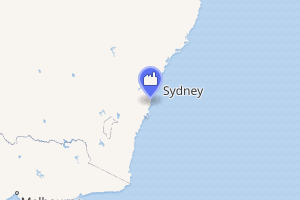Tallawarra Power Station
Tallawarra Power Station is a 435-megawatt (583,000 hp) combined cycle natural gas power station[1] in the city of Wollongong, New South Wales, Australia. Owned and operated by EnergyAustralia, the station is the first of its type in New South Wales[2] and produces electricity for the state during periods of high demand.[3] It is located on the western shore of Lake Illawarra in the suburb of Yallah.
| Tallawarra Power Station | |
|---|---|

| |
| Country | Australia |
| Location | Yallah, western shore of Lake Illawarra, Wollongong |
| Coordinates | 34°31′22″S 150°48′29″E |
| Status | Operational |
| Commission date | 2009 |
| Owner(s) | EnergyAustralia |
| Operator(s) | |
| Thermal power station | |
| Primary fuel | Natural gas |
| Combined cycle? | Yes |
| Power generation | |
| Units operational |
|
| Make and model | Alstom |
| Nameplate capacity | 435 megawatts (583,000 hp) |
The station comprises a 260-megawatt (350,000 hp) gas turbine and a 160-megawatt (210,000 hp) steam turbine unit[3] and has a total capacity of 435 megawatts (583,000 hp).[1] It uses many of the previous power station's structures including the cooling system channels from Lake Illawarra. The power station is connected to the state grid via a 132kV switching station maintained by Endeavour Energy (Previously known as Integral Energy).
TRUenergy has also indicated that an additional power plant is being considered for the site, to be known as Tallawarra B.[1]
History
Tallawarra originally operated as a coal-fired power station beginning in 1954 and reaching full operation by 1961.[4] At its peak, it had a capacity output of 320 megawatts (430,000 hp). 'A' station had four 30-megawatt (40,000 hp) Thomson-Houston 2 stage (HP+LP) turbo generators. Steam was supplied by four Simon Carves pulverised fuel boilers at 140,000 kg/h (300,000 lb/h) at a pressure of 4.31 MPa (625 psi) and a temperature of 463 °C (865 °F). In 1960 "B" station was built having two 100-megawatt (130,000 hp) English Electric 3-stage turbo generators (No. 5+6). The generators were hydrogen-cooled but didn't have any stator water cooling. Steam was supplied by 2 ICAL pulverised coal burning boilers at a rate of 360,000 kg/h (800,000 lb/h) at a pressure of 11.6 MPa (1,680 psi) and a temperature of 538 °C (1,000 °F). The station closed in 1989, and stood abandoned by the foreshore of Lake Illawarra. It was demolished over a ten-year period.[5]
In early 2003 the site was sold by Pacific Power to TRUenergy (then known as TXU) and construction of the gas-fired combined cycle plant began in November 2006. The plant consists of a gas turbine of 288 megawatts (386,000 hp) and a 3-stage steam turbine of 160 megawatts (210,000 hp) with a single 450-megawatt (600,000 hp) generator. A unique feature is the waste heat boiler with a super heater and two reheater sections for the IP and LP stages of the turbine. Overall thermal efficiency is 60%.[6] It was opened by the NSW Premier Nathan Rees on 18 March 2009.[7]
References
- "Tallawarra Power Station". EnergyAustralia. Retrieved 24 June 2015.
- "Tallawarra power station". TRUenergy. Archived from the original on 31 August 2007. Retrieved 8 March 2009.
- "Tallawarra Power Station FAQs". TRUenergy. Retrieved 8 March 2009.
- "Yallah History". Wollongong City Library. Archived from the original on 18 June 2009. Retrieved 8 March 2009.
- "Transforming Tallawarra: GT26 based plant for booming New South Wales". Modern Power Systems. Archived from the original on 14 July 2011. Retrieved 28 September 2007.
- "Tallawarra recent history". TRUenergy. Archived from the original on 27 March 2009. Retrieved 8 March 2009.
- "Tallawarra taking off in NSW". EcoGeneration. Archived from the original on 25 September 2009. Retrieved 25 April 2010.